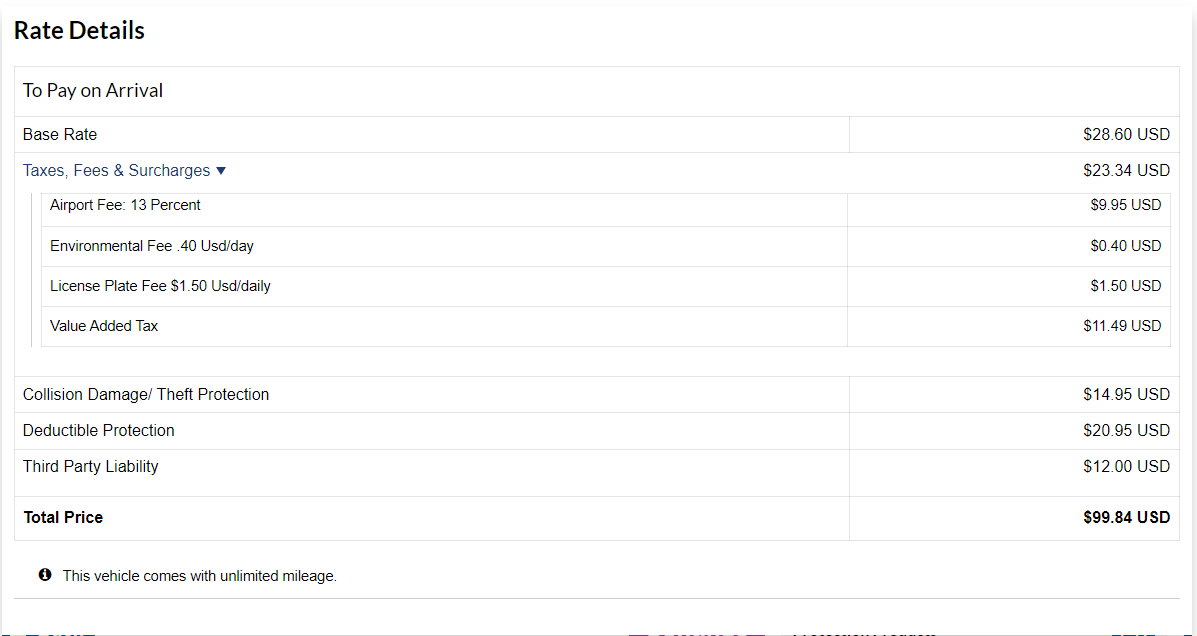Car Rentals in Costa Rica: What Every Traveler Should Know
There are many articles discussing whether to rent a car when visiting Costa Rica. For those who have decided to rent a car for their Costa Rica adventure, uncertainty about prices can be a concern, especially regarding taxes, fees, insurance, and other potential charges. Many people have had bad experiences thinking that the low prices shown on rental car agency websites were the total cost, only to realize they had to pay double or more during the check-in process at the rental car agency counter.
The good news is that this uncertainty is unnecessary. Renting a car in Costa Rica can be a smooth experience that opens up many destinations and fun adventures. This article will explain the essential information you need to know before renting a car for your trip to Costa Rica.
Choosing the Right Rental Company
The first key step is to choose a reliable rental car company in Costa Rica. Otherwise, the quality of your vehicle, customer service during any eventualities, and the options for picking up and dropping off your car will be severely limited. We have successfully worked with Alamo, Adobe, and Economy rental cars. Currently, we have partnered with Alamo and Adobe to bring you the best options and benefits. Through our partnership, you receive guaranteed discounted rates and access to complimentary services that would otherwise incur additional costs through their websites and counters. To benefit from these offers, please click here to book your rental car or email us for more information.
Understanding Insurance Options
When renting a car, there are various types of insurance and waivers available, offering coverage for different types of accidents and emergencies. These protection options provide peace of mind, knowing that you will be covered and taken care of when needed.
Optional Insurances:
Most protection options are optional and cater to specific needs. Examples include:
- Tires & Windshield Protection (TWP): This waives the customer’s liability in the event of damage to tires, the windshield, or windows.
- Deductible Protection (DP): When purchased as an additional protection along with other specific insurances, it reduces the renter’s Collision Damage Waiver-Theft Protection (CDW-TP) and Third-Party Liability (TPL) deductible to $0.
Mandatory Insurances:
In Costa Rica, there are two protection products required by law:
- Third-Party Liability (TPL), also known as “Liability Protection,” is mandatory in Costa Rica and must be included in your rental. You can only decline it if you opt for a more comprehensive Protection Package or an Extended Protection option that includes TPL.
Key Points to Remember:
Coverage Scope: TPL insurance covers damages to other people, their vehicles, or their property. It does not cover damages to your rental car.
Responsibility for Damages: Unless you purchase additional coverage or have documented insurance from your credit card, you are responsible for any damages to the rental vehicle.
Legal Requirement: TPL insurance is mandated by Costa Rican law and must be purchased from the National Insurance Institute of Costa Rica (INS) through your rental car company. Credit card coverage, including those from premium cards, cannot replace this legally required insurance.
- Collision Damage Waiver and Theft Protection (CDW-TP), also known as “Car Protection,” is typically required unless you opt for a more comprehensive Protection Package or have coverage through a major credit card. While many credit cards offer this benefit, it is crucial to confirm this with your credit card company before your trip.
Key Points to Remember:
- Coverage Scope: CDW-TP is a supplement provided by the rental company to reduce your liability for damage to the rental car in the event of an accident. The liability is limited to the deductible amount, which varies depending on the rental company and the vehicle.
- Limitations: You are still responsible for all losses or damages resulting from negligence, vandalism, road damage, or theft unless Theft Protection (TP) is explicitly included in the coverage.
- Verification: Ensure that your credit card offers the necessary coverage for Costa Rica and understand the terms and conditions, as this can significantly impact your liability and overall rental experience.
It’s crucial to be aware of these two mandatory protection products and ensure they are included in your rental to avoid unexpected costs. If not added during your online reservation, they will be charged at the rental agency counter, potentially doubling the initial price.
For more information about mandatory and optional insurances and waivers, please visit: Rental Car Details.
Taxes, Fees & Surcharges
When booking your car, the initial rates shown in the website usually include taxes, fees & surcharges, at least that’s the case with Alamo. The most common taxes, fees & surcharges are Airport Fee, Environmental Fee (0.40 Usd/day), License Plate Fee ($1.50 Usd/daily) and the Value Added Tax (VAT) known in Costa Rica as Impuesto al Valor Agregado or IVA for short.
At the moment of payment, please make sure these items are included, as well as the protection products you chose, this will give you the exact final price avoiding surprises at the rental car company counter.
Airport Fees:
This is a tax that airports charge in order to allow rental car companies receiving their customers at their counters within the airport. The fee is up to 13.75%. If the rental is requested manually and directly through reservations (for example when booking through Link Expeditions via email), this fee is waived. However, if the client books through the widget on our website, the fee is still applied as the booking is processed as a web rental. Please note that most rental companies do not charge an airport fee, only those with counters inside the airport do, including Alamo, Enterprise and National.
Environmental Fee:
The Environmental Fee is typically a small, fixed amount added to the total rental cost. It covers taxes for vehicle emissions and is intended to help rental companies mitigate their environmental footprint and contribute to broader sustainability goals. This fee varies by company and location, and not all rental companies may charge it.
License Plate Fee:
A License Plate Fee in car rentals is a charge to cover the cost of vehicle registration and license plate issuance. It ensures the rental company’s fleet is legally compliant and helps offset administrative expenses related to maintaining registered and licensed vehicles. This fee is typically a small, fixed amount added to the rental cost.
IVA or VAT Tax:
The Value Added Tax (VAT), known as Impuesto al Valor Agregado (IVA) in Costa Rica, is a consumption tax applied to the sale of goods and services, akin to sales tax in other countries. In Costa Rica, the standard rate for IVA is 13%, though reduced rates may apply to specific goods and services. While the tax is typically included in the price of most products and services, occasionally, it may be listed separately. Therefore, it’s important to be mindful of this additional percentage when making payments. Businesses collect this tax and subsequently remit it to the government, contributing to national revenue.
Mileage (Distance):
It refers to limits placed on the number of miles or kilometers you can drive during your rental period. If you exceed these limits, you may incur additional charges. These restrictions can vary by company and rental agreement. Most rental car companies in Costa Rica offer unlimited mileage meaning that there are no restrictions on the number of miles or kilometers you can drive. However, Hertz has mileage restrictions and related charges for shorter rentals of 1-2 days.
Rental Car Booking Example:
Displayed below is a screenshot of the rate breakdown for reserving a rental car with Alamo. This booking is for an Intermediate SUV 4×4, such as a Suzuki Vitara, or similar, designed to accommodate up to 5 passengers and 4 bags for a one-day rental period (24 hours).
In this booking, we’ve opted for the two mandatory protection products: Collision Damage/Theft Protection and Third-Party Liability, along with Deductible Protection, which reduces the deductible to zero in case of any incidents.
Please take note of the base rate, taxes, protection products, and unlimited mileage included in the booking. This comprehensive breakdown ensures transparency, allowing you to see the final price upfront. With all items and amounts clearly displayed, you can rest assured that there will be no surprises at the rental car counter.

Booking in Advance
Choosing the right car for your trip is crucial. Some travelers might plan to explore off-the-beaten-path locations and therefore need a 4×4 vehicle. Others may prefer visiting popular destinations with good road infrastructure but require more spacious cars. Regardless of your requirements, booking your rental car in advance ensures you secure the vehicle that perfectly aligns with your travel style and preferences.
Booking your rental car in advance offers several advantages, including access to better rates, expanded service options, and enhanced planning capabilities. At Link Expeditions, we highly recommend securing your rental car ahead of time to ensure peace of mind, avoid inflated prices, and guarantee a wider selection of vehicles to choose from.
Checking Driving Requirements
To rent and drive a car in Costa Rica, you must present your country’s valid driver’s license with latin alphabet characters (e.g., Spanish, German, English). If the driver’s license is in characters other than Latin, an International Permit is required or a Notarized English Translation is also accepted. Additionally, you must present your passport, ensuring it is stamped with the date of entry into the country.
The minimum age to rent a car in Costa Rica varies by agency. For example, the minimum age is 21 years for agencies like Alamo, and 23 years for agencies like Adobe. A few rental agencies, such as Economy Rental Car, will consider renters as young as 18 on a case-by-case basis, provided the renter has a full coverage insurance policy and a major credit card in their own name. Drivers aged 21 to 24 will typically incur an additional fee at most agencies. Adobe also requires that drivers have been driving legally for at least two years. If booking through our partnership with Adobe and Alamo Rental Cars, please visit: Rental Car Details to learn more.
Remember to bring the following documents with you:
- A valid original driver’s license
- A valid passport
- A physical credit card with the cardholder present and sufficient funds for payment and the security deposit
Considering Your Options: Extras and Additional Services
You can enhance your rental car experience in Costa Rica with a range of extras and additional services offered by rental car agencies:
- Additional Drivers: Share the driving responsibilities with up to three additional drivers depending on the rental car agency.
- Prepaid Gas: The car will be delivered with Full gasoline and must be returned with full coverage except if the prepaid Gasoline product is purchased. With which you can return the car with the gas tank at any level.
- Toll Payment Pass: Avoid delays and complications on your journey with a toll payment pass, allowing you to cross Ruta 27 highway without the need for cash or waiting.
- Mobile Internet Access: Stay connected during your trip with mobile internet access, enabling navigation and sharing of adventures.
- Cell Phone: Rent a cell phone for assistance and stay connected throughout your journey.
- Child Seats: Ensure the safety and compliance of your young passengers with age/weight-appropriate child seating, including baby seats or booster seats, as mandated by Costa Rican law for children under 12 years old. Here’s a summary of the requirements:
- Car seats or booster seats are required for children 12 and under, up to 57 inches/145 cm or 79 pounds/36 kg.
- Infants up to one year old should be rear-facing in the middle seat, while children ages 1-4 should be front-facing in the middle seat.
- If you have multiple children, the lighter child should occupy the middle seat, with the other positioned behind the passenger seat.
- Children ages 4-6 should utilize a booster seat with a back, while those ages 6-12 should use a booster seat without a back.
- Roof Racks: Transport surfboards or luggage securely with roof racks provided with your rental car.
These extras and additional services enhance your travel experience, providing convenience, safety, and flexibility throughout your journey. Remember some of these extras are complimentary through our Link Expeditions partnership with Adobe and Alamo rental car agencies. Learn more about our partnership Here.
Upon Arrival in Costa Rica
What to Do
After landing at San Jose (SJO) or Daniel Oduber (LIR) International Airports, follow the signs to Immigration, Baggage Claim, and Customs. Once you’ve cleared customs and claimed your luggage, proceed towards the airport exit, keeping an eye out for representatives from your rental car company.
Where to Go to Check-In and Get Your Rental Car
After claiming your luggage, look for representatives from your rental car company, such as Alamo or Adobe. If there is no counter visible, head towards the airport exit and look for a representative holding a sign with your name or the company logo. They will greet you, assist with your luggage, and escort you to their shuttle bus, which will take you to the nearby rental office.
Note that not all rental car agencies in Costa Rica offer meet-and-greet services and shuttles. If you do not find a representative, go to the airport information desk or call the rental office directly. In some airports, such as Liberia (LIR), there may only be one representative who might be temporarily unavailable due to assisting another client or taking a short break. Please be patient and wait for a response.
At the Rental Car Agency Counter
Once you arrive at the rental car office, proceed to the rental car agency counter. The staff will guide you through the check-in process and provide any additional information you need.
Paperwork
Be prepared with the following documents:
- A valid driver’s license with Latin characters
- Your passport with the entry stamp
- A physical credit card for the security deposit and payment
- The rental agent will help you complete the paperwork, including signing the rental agreement and reviewing the rental terms.
Deposit
A security deposit, usually ranging from $500 to $1,000, is required and will be held on your credit card. Ensure your credit card has sufficient available credit to cover this deposit. It will be released once you return the car in good condition.
Inspecting the Vehicle/Video Documentation
Before driving off, thoroughly inspect the vehicle and note any pre-existing damage and fuel levels. Ensure this is documented by the rental agency. It is highly recommended to take a video or photos of the car’s condition from various angles. This documentation can be crucial if there are any disputes about damage upon return. Also, confirm that any requested extras, such as baby seats or GPS, are provided.
Knowing Your Car
Take a few minutes to familiarize yourself with the car. Adjust the mirrors, locate the headlights, windshield wipers, emergency break, and other essential controls, including gears and 4WD features. If you have any questions about the vehicle’s features, ask the rental agent for a quick overview. Understanding your car will help ensure a smoother and safer driving experience during your trip.
Navigating Costa Rican Roads
Driving in Costa Rica can be an adventure, offering the freedom to explore this beautiful country at your own pace. However, there are some important aspects to consider to ensure a safe and enjoyable driving experience.
Road Infrastructure
The road infrastructure in Costa Rica varies greatly. While certain highways, notably those in San José, and between San José and Puntarenas, as well as between Liberia and Limonal, are well-maintained, many other roads lack sufficient lanes, signage, traffic lights, reflectors, and police stations. In smaller towns, roads are typically paved but may lack painted lanes or reflective markers. Rural areas often feature unpaved and narrow roads, necessitating the use of a 4×4 vehicle.
Driving Tips
- Drive Cautiously: Given the variable road conditions, it’s crucial to drive cautiously. Avoid driving at night, especially during the rainy season, as visibility and road conditions can deteriorate rapidly.
- Defensive Driving: Adopt a defensive driving style. Expect to be honked at, cut off, and for other drivers not to yield. Stay calm and avoid road rage.
Know the Rules
- Driving Side: Costa Rica drives on the right side of the road, similar to the USA and Canada.
- Traffic Signs: Signs are in Spanish but follow the same shapes as those in the USA and Canada.
- Metric System: Speed limits are in kilometers per hour (km/h) and fuel is measured in liters.
- Speed Limits: The typical speed limit on highways is 90 km/h (about 55 mph). Pay attention to posted signs for specific speed limits.
Emergency Numbers and Assistance
In case of an accident or emergency, follow these steps to ensure you receive prompt assistance:
- Step 1: Contact Emergency Services: If there are injured people, call 911 immediately.
- Step 2: Report to Your Rental Car Company: Immediately report the accident to your rental car company’s emergency number:
- Adobe Rent a Car: (506) 2542-4888
- Alamo Rent a Car: (506) 2242-7733
- Step 3: Provide all pertinent information, including details about any witnesses. If possible, take pictures of the scene. Do not move the vehicle until you receive instructions from your rental company.
- Step 4: Contact the Traffic Inspector: Call the traffic inspector at 800-TRANSITO (506) 800-8726-7486.
Additional Contacts for Adobe Rent a Car:
- If the incident occurs between 8:00 a.m. and 7:00 p.m., call the central Adobe offices at (506) 2542-4800.
- If the incident occurs outside of regular business hours, call the Adobe emergency number at (506) 2542-4888.
Additional Contacts for Alamo Rent a Car:
- For roadside assistance, call 1-800-803-4444.
If you forget these numbers, please refer to the contract or other printed documents provided by the Rental Car Company.
Renting a car in Costa Rica offers many advantages to experience the country’s natural beauty and vibrant culture. By choosing a reliable rental car company and understanding the essential aspects of the rental process, you can ensure a smooth and enjoyable journey. If you still have questions about the rental car process, feel free to read these details or email us at hello@linkexpeditions.com
Feeling ready to rent a car?
Enjoy the flexibility that comes with having your own wheels.
Book Today!
Ultimate Packing List to Travel Costa Rica for Two Weeks or So!
Planning a trip to Costa Rica? Discover the ultimate packing list to ensure you’re ready for an unforgettable adventure in this tropical paradise!

Costa Rica Cultural Experience Tour at Diamante Eco Adventure Park
Experience a captivating sample of Costa Rican culture and wildlife at Diamante Eco Adventure Park. Enjoy a 2-hour tour that includes a visit to an animal sanctuary, botanical garden, and traditional farmhouse. Perfect for all ages!
Excursions
These are tours, activities or experiences that Link Expeditions recommends. Most of these excursions are nature-based and sustainable.
